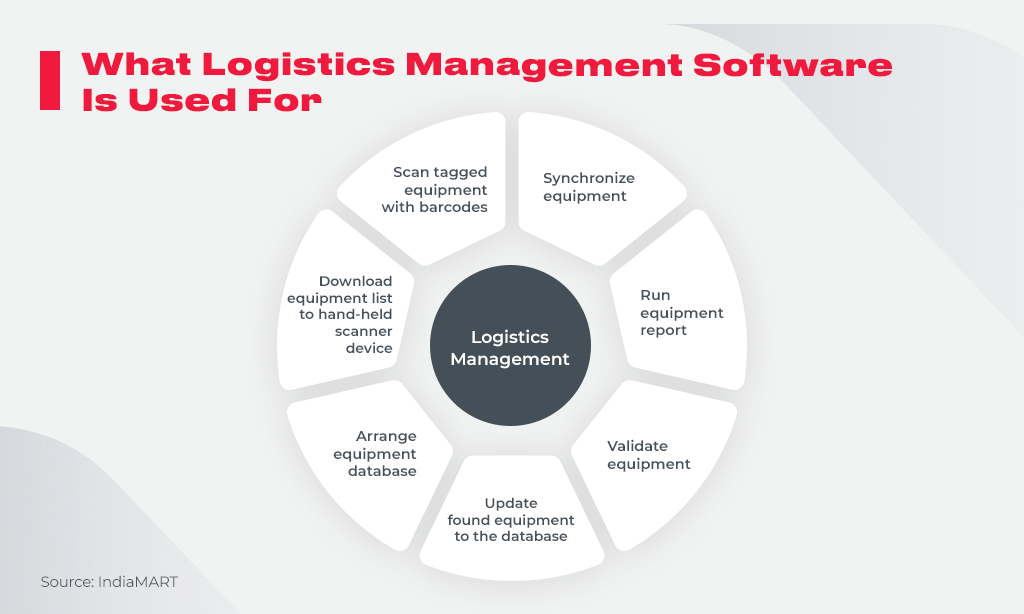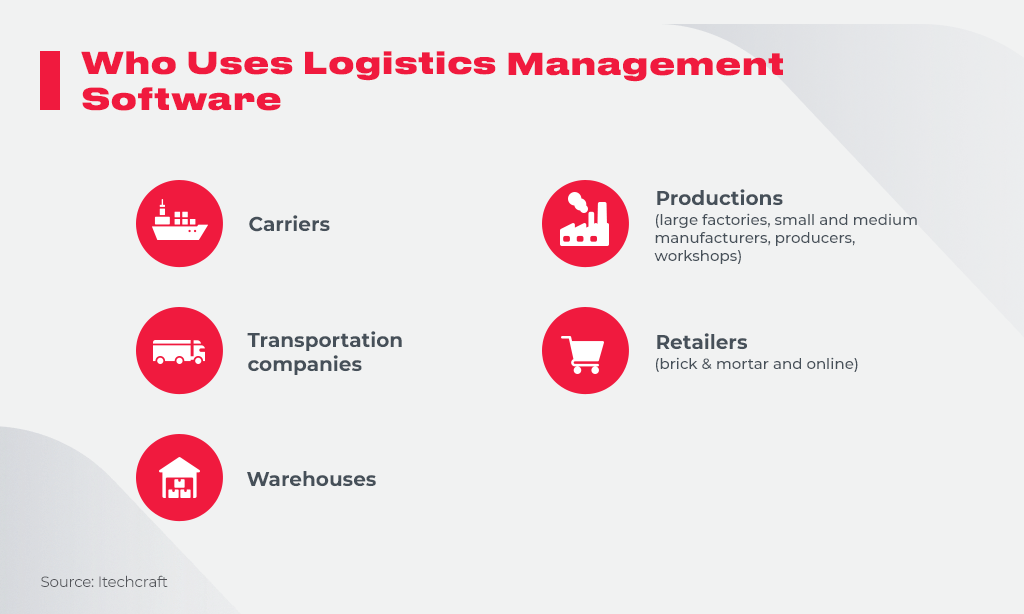Logistics Management Software: Potential to Build a “Day 1” Company with High Profit
Companies in many fields of the industry apply logistics management software to boost performance, efficiency, and revenue. Carriers utilize it to get smoother collaboration with the drivers. Retailers are striving to get custom LMS products for better communication with the end-users.
Logistics management software contributes to inventory consolidation, operations streamlining as well as making shipping management more perfect gaining satisfied customers, who will return again and again to get the same high service quality.
Logistics management software (LMS) is growing in demand more and more in supply chain management because companies are striving for secure transporting and delivering goods worldwide with the lowest risks and the highest profits. Thus, for example, Pfizer couldn’t become one of the world’s biggest providers of sterile injectables, DHL wouldn’t be able to perform quick secure express shipments, and Amazon would have no possibility to adjust their popular marketing concept of “one-day door-to-door” delivery without highly technological digitized processes and operations.
The global connected logistics market is expected to increase at a CAGR of 17.5% between 2021 and 2026. Logistics management software opens new possibilities to arrange clear transportation schemes, minimize human errors, fasten deliveries, automate tracking, and reduce costs. DHL logistics of things illustrates how LMS can break orders into batches in accordance with the locations, decrease shipment errors, and manage returns for better business functioning.
In this blog, we introduce an overall LMS profile as well as describe a variety of cases of how rebuilding the warehouse management system, and improvements in tracking or processing packaging contribute to easy business scalability and boosting revenues.
We’ll share how Innovecs’ expertise in delivering custom logistics management software is able to empower your company’s mission in customer service enhancements:
- making deliveries faster;
- securing goods dispatching risks;
- improving your competitor’s advantages (better accuracy, cost reduction, top security benchmarks).
What Is Logistics Management Software?
Logistics management software systems propose mechanisms of resources planning, optimizing human flow, and efficient cost management. ScienceDirec.com explains logistics management as a “part of the supply chain process” ruling the flow of goods and services from the point of storage and packaging to the point of consumption.

Once a company is willing to improve these processes, it has several ways to follow: perform a qualitative audit, improve separate operations due to proper consulting, and implement LMS systems to digitize the management of the whole logistics. The last one is widely used because, in the competitive market, environment speed, accuracy, and strong connection between the participants matter.
This quotation’s goals can be reached in practice in the following ways:
- ERP (enterprise resource planning) design, which is the global strategic management of financial, human, and assets resources for the sake of better company functioning
- WMS (warehouse management system) targeted to arrange goods storage, order packaging, dispatching, and returns control
- LMS, which is wider than just storing, loading, and dispatching; it also includes the strategic planning, forecasts, and breach analyses
Before making high-tech improvements, it’s worth thinking of the current company’s situation and its objectives regarding the budget for digitalization. To ease the analyses, it’s reasonable to distinguish the following elements of a logistics management system: storage, warehousing, and materials handling; packaging and unitization; inventory; transport; and information and control. Improvements in every field can increase business profits.

Benefits of LMS: Custom and Ready-to-Use Solutions
Basic characteristics of modern logistics management solutions in the industry bring a variety of perks for the company. Multi-user architecture, real-time control, and visibility, smart and user-friendly interface, functionality for contract and invoices issuing, automated vendor management, comprehensive reporting, and tracking give the possibility to open a new level of business profits generation and company development.

Moreover, nowadays businesses should act more responsibly as they want to be socially conscious and accepted widely by consumers. “Great Pacific Garbage Patch” illustrates this new law of business functioning and notes that businesses acting responsibly tend to succeed more because people choose products and services provided by sustainable producers.
It’s also mentioned in a TED talk by Markus Mutz, CEO of social OpenSC social venture. There he mentioned the trends of buying products with a known source of manufacturing with minimal harm to Earth.
We speak about this information among the benefits of logistics management software because once you optimize the whole process, you have more chances to meet global sustainability demands. Custom LMS development alongside quality management, human errors reduction, and costs optimization proposes waste management and eco-friendly raw materials purchasing.
So, your company has more chances to increase its profit via sustainability. Business social acceptance will grow, too, because of new social values generated. Let’s shed some light on how it works by getting acquainted with real cases and logistics trends in the current year.
Logistics Management Trends in 2023
According to McKinsey technology trends, cloud solutions defined 2022. The use of cloud for effective and optimized supply chain management, with more effective demand forecasting, precise scheduling, and route optimization dominated last year’s logistics.
Shipsy, a provider of the tools simplifying logistics, outlines the following 2023 trends in logistics:
- diversified service and product offerings;
- sustainability;
- digitization to drive business growth;
- reshoring and nearshoring in manufacturing;
- automation, analytics and blockchain.

Innovecs believes in the great possibilities of the LMS custom-developed considering the needs and priorities of your company. Our expertise is enough to establish close collaboration at every stage of LMS product development.
Cases to Visualize LMS Possibilities for Business
Globenewswire.com calculated that “the global warehouse and storage market size would reach USD 654920 million by 2028, from USD 528320 million in 2021, at a CAGR of 3.1% during 2022-2028”.
That is why in the blog we are outlining the most vivid cases of how a company could introduce LMS tools performing a wide range of comprehensive changes. Forbes stresses the fact that warehouse operators, retailers, and everybody willing to build “A Day 1” company are to “think of a high expertise technology partner” to collaborate within the LMS introduction.
Logistics management software is used by companies for better performance in different fields of the industry. Carriers use it for better tracking and smooth communication with the drivers, retailers find it for better communication with the end-users, larger factories for improvements in purchasing and production.
Every industry player has unique purposes, but the progress after LMS implementation is obvious like in the case of Amazon or DHLS, the giants of the worldwide market. Innovecs is a global digital tech transformation company. And our expertise in the development or rebuilding of logistics management software from scratch is proven by a number of successful cases.
“It was a collaboration with the US Cold Storage company to tackle the problem of poor WMS stability and the necessity to renew the codebase to increase its performance. It was more than 2 million lines of code written, eight times deployment speed increased, and custom features integrated in accordance with the client’s requirements. As a result, the client got a smoothly functioning part of the LMS tool”

When Amazon launched in 1997, they had two logistics centers. Now they are one of the top three highly technological companies (Google, Apple, Facebook). They handle four million deliveries daily due to efficiently automated 75 fulfillment centers and 25 sortation ones. Amazon’s 2-day free delivery “Prime Now” program for US users is possible only due to their scalable and effective digitized logistics scheme.
DHL performs perfect qualitative deliveries because they developed a logistics management system, which streamlined the operations and improved control. They are constantly analyzing supply chains, initiating delivery network restructuring, and dealing with the economic modeling to forecast the results of technological changes. And that is what every company needs at the start of logistics management system implementation.
SupplyChain247.com placed “Supply Chain Lessons from Amazon’s Jeff Bezos,” where he stressed that “Amazon was not just a company, but a way of doing business.” It could be said that a logistics management system is also a way of doing business, of arranging the operations not half-manually, but via developed custom software to ensure quality and control for better operation practices. Bezos, in this lesson, specified about Day 1 and Day 2 companies. Day 1 companies have much potential to grow, speedy decision-making, and they are open to innovative growth.
FedEx provides changes like true “Day 1” through omnichannel supply chains, and utilizes logistics management software to boost the productivity of the fulfillment centers, to initiate operations of the top-tier warehouse management systems, and enhance tracking capabilities and visibility options for control throughout the supply chain. FedEx declares interest in such technologies as blockchain and IoT for their logistics management software development as a part of “company strategy to improve customer service and fend off the competition.”
In the examples above, it’s obvious that logistics management software speeds the deliveries, decreases errors level, and enables the possibility to provide customers with unique shipment proposals. These grant competitive advantage, and the company has a chance of easy scalability and business development for bigger profits.
How to Introduce LMS for Better Company Performance: Conclusion Tips
In the modern market to be sustainable it’s critical to go digital. Logistics management software brings a lot of benefits in this aspect if it’s implemented responsibly.
When a company prepares to utilize logistics management software, it’s worth thinking of the following options:
- its objectives;
- outlining who and where in the company will use the software; and
- stipulating the technologies proper for the request (e.g., blockchain is good for smart contacts and contracts, and AI is perfect for warehouse management).
Logistics management software is helpful in a variety of operational tasks. And if you are willing to learn more about what’s suitable for your business growth and reaching the specific objectives, you are welcome to apply for Innovecs experts’ detailed consultation.

The performance of the tasks LMS copes with empowers company development and is able to bring your business to a new qualitative level.
So, if the blog made you think of the benefits LMS is able to grant your company’s growth and revenue boost, do not hesitate to contact us to discuss in detail how the logistics management system can contribute to becoming the market leader.